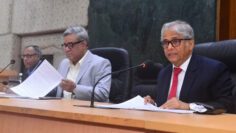Who is Ebrahim Raisi, Iran’s next president?
Raisi is referred to as a likely successor to the 82-year-old Khamenei when he passes away.
Before the 1979 revolution
Growing up in a clerical family, Raisi received a religious education and began attending the seminary in Qom when he was 15. There, he studied under several prominent scholars, including Khamenei.
When his education came up during the presidential debates, he denied that he has only six grades of classical education, saying he holds a PhD in law in addition to his seminary education.
When he entered the influential seminary in Qom just years before the 1979 revolution that brought about the Islamic Republic, many Iranians were dissatisfied with the governance of Mohammad Reza Shah Pahlavi, who was ultimately deposed.
Raisi was purportedly a participant in some of the events that forced the shah into exile and set up the new clerical establishment under Supreme Leader Ayatollah Ruhollah Khomeini.
After the revolution
A crucial development came when he moved to Iran’s capital, Tehran, in 1985 after being appointed deputy prosecutor.
Human rights organisations say three years later, just months after the gruelling eight-year Iran-Iraq War ended, he was part of a so-called “death commission” that oversaw the disappearing and secret executions of thousands of political prisoners.
Raisi will become the first Iranian president to have been targeted by United States sanctions, imposed in 2019, over his alleged role in the mass executions and for cracking down on public protests.
Amnesty International has called for the leader to face charges of crimes against humanity.
The leader continued to rise within Iran’s judicial system following Khamenei’s accession to the supreme leadership in 1989. He later held roles as prosecutor of Tehran, then headed the General Inspection Organization, and then served as deputy chief justice for a decade until 2014, during which time the pro-democracy Green Movement protests of 2009 took place.
In 2006, while serving as deputy chief justice, he was for the first time elected from South Khorasan to the Assembly of Experts, a body that is tasked with choosing a replacement for the supreme leader in the event of his death. He still holds that role.
Raisi was promoted to attorney general of Iran in 2014 and remained in that position until 2016, when he climbed the ladder yet again – albeit outside the judicial system this time – and was appointed by the supreme leader as the custodian of the Astan-e Quds Razavi, a huge bonyad, or charitable trust, that manages the shrine of Imam Reza and all affiliated organisations.
In that position, Raisi commanded billions of dollars’ worth of assets and made ties with the religious and business elite of Mashhad, Iran’s second-largest city.
Raisi, who has two daughters, is also the son-in-law of Ahmad Alamolhoda, the hardline longtime Friday prayer leader of Mashhad, who has become known for his fiery ultraconservative speeches and highly controversial remarks and ideas.


















